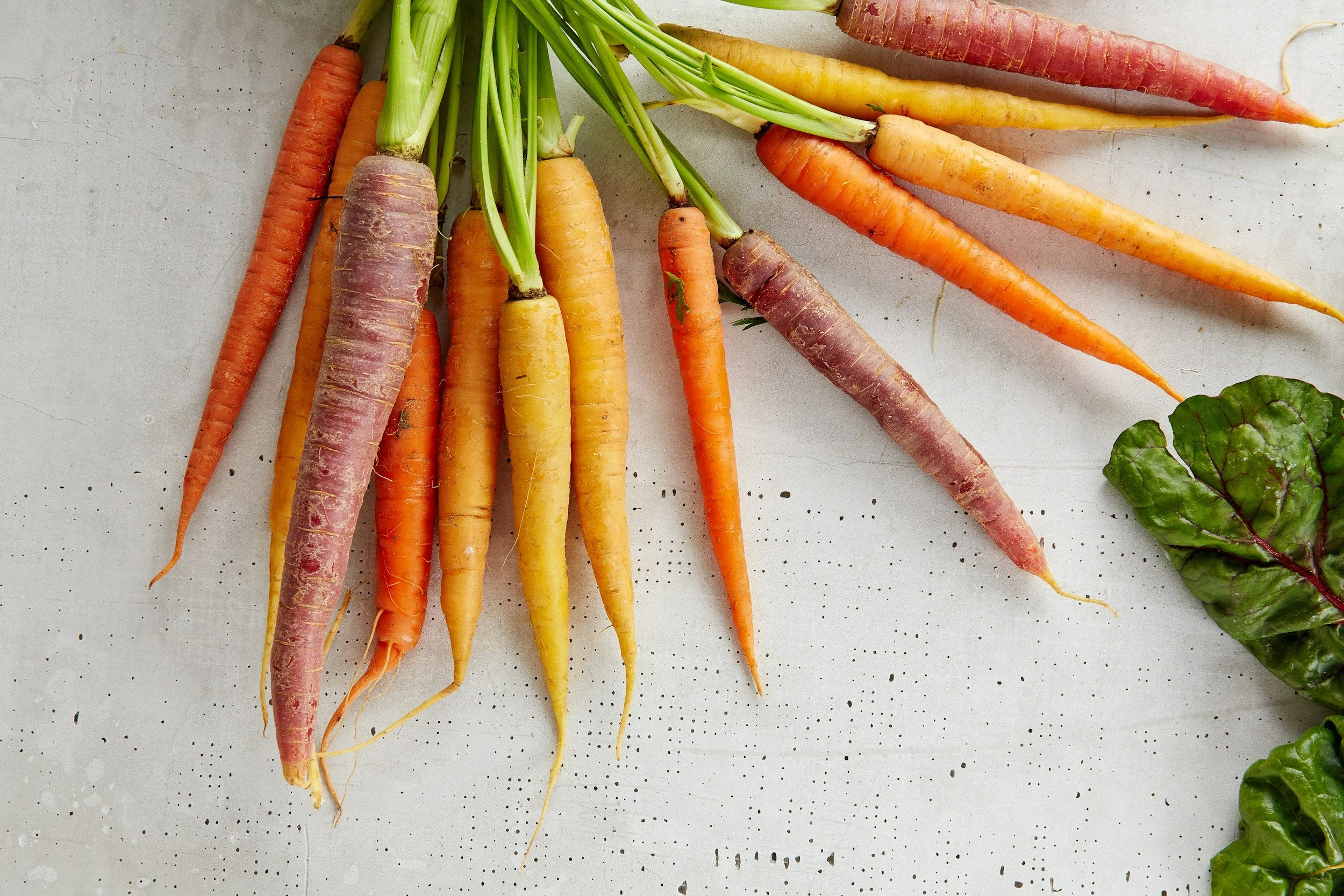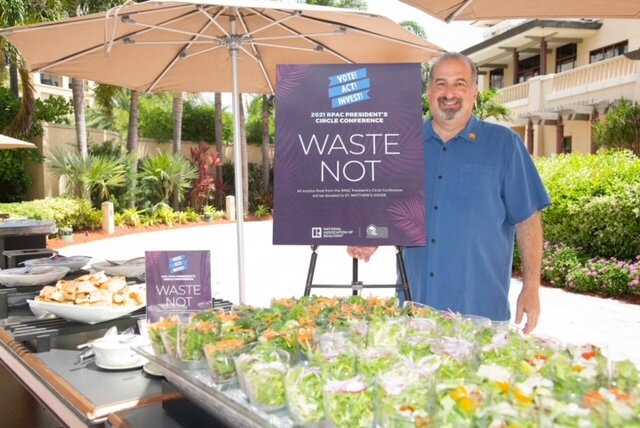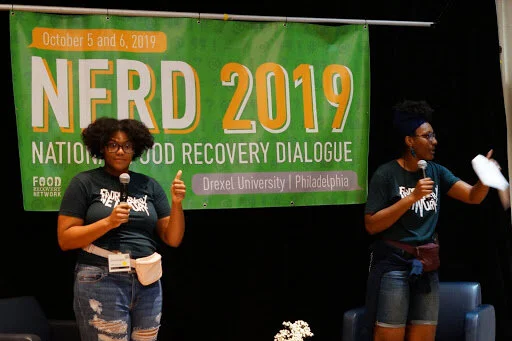
Recently published news and opinions from Food Recovery Network
Meet Elaine Losekamp, FRN's Newest Team Member!
This month, we are thrilled to welcome Elaine Losekamp as the newest member of the FRN team! Elaine will serve as Program Associate, using her lived experience with FRN and the food and agricultural sector to continue strengthening our programs and propelling the food recovery movement further.
About Elaine
Elaine is a graduate of Western Kentucky University (WKU), where she studied Agriculture and founded an FRN chapter. While leading the WKU chapter and maintaining her studies, Elaine also served as Committee Chair for FRN’s Student and Alumni Advisory Board (SAAB) and she supported FRN’s Food Recovery Verified program as an intern for nine months. Elaine has worked in food systems in several different capacities, including a multi-year internship at a community garden and a position with a gleaning nonprofit for which she developed a regional gleaning initiative. She is a strong believer in the importance of food waste reduction to our efforts to mitigate climate change.
Top Highlights as WKU Chapter President
The biggest highlight of my time as Chapter President was seeing my chapter grow and become self-sustaining. It was incredible to watch the enthusiasm for and participation in my chapter grow on campus and in the wider community.
A year after my chapter was founded, a local restaurant invited us to recover over 1,000 pounds of food. It was my chapter’s largest recovery ever, and we pulled it off in three days! Completing such a big recovery gave us the confidence and motivation to expand our network of donors and continue recovering food throughout the COVID-19 pandemic.
During my last semester, my chapter recovered its 5,000th pound of food and our fantastic advisors at WKU put together a recognition ceremony, attended by the University President, to celebrate our accomplishments. The ceremony fell on my 22nd birthday, and the University President led the crowd in singing happy birthday. It was definitely an event to remember!
Advice for New Chapter Leaders
Don’t give up! Establishing a new chapter can be extremely challenging and at times discouraging, but if you keep working at it, eventually all of the pieces will fall into place and your chapter will have an incredibly positive impact on your community.
Elaine’s Vision for a Just and Equitable Food System
In a just and equitable food system, everyone would have access to nutritious food, and producing that food would have a minimally negative impact on our climate, natural resources, and the other living beings on our planet. Workers would be paid a fair wage to grow, harvest, and process food and would have safe working conditions. Animals used for meat, egg, and dairy production would be treated ethically (and people’s diets would have a much greater emphasis on plant-based foods and include far fewer animal products). Food would be consumed close to where it was produced, waste would be minimized, and methods of food production would be ethical and sustainable.
Starting this fall, Elaine will be in close contact with all of our Student Chapters to make sure everyone has a great semester. We hope you’ll join us in giving her a warm welcome!
What are we trying to accomplish in Atlanta?
As we reflected on our unique contribution to closing racial and ethnic disparities in the U.S., we prioritized expanding our model within 10 states which have both an abundance of surplus food (according to the EPA) and more than 20% of the population experiencing hunger (according to Feeding America). Within those 10 states, we sought to pilot programs, outside of our traditional chapter model, in areas which would help us learn how we could feed more people faster. That brings us to Atlanta, Georgia.
By partnering with the Atlanta Mayor’s Office of Resilience and the Environmental Protection Agency (EPA) our students, volunteers and alumni at Georgia State University and Emory College are participating in three pilots to help us evaluate, how can we move the most fresh produce, to feed the people in the most need, fastest?
The three pilots are:
(1) paying local small farmers directly for the labor to glean surplus produce and transport it to Atlanta hunger-fighting partners in the areas with the most need (as determined by the Mayor’s Office of Resilience);
(2) training students from Georgia State University and Emory College to glean surplus food from farms and assist the farmer in finding alternative marketplaces to sell produce at a reduced cost; and
(3) students and alumni will glean from local community gardens and urban farms and donate the produce to a local community nonprofit serving community members experiencing hunger.
These pilots will run throughout this summer and into the fall. Please be sure to check back here as we report on our progress. It is our hope that through this pilot, we can replicate the most successful strategies in other parts of the country so we can continue to ensure food is not wasted.
National Association of REALTORS® and FRN - Opening Back up to Continued Leadership
I remember a couple of years ago when the National Association of Realtors® (NAR) came into Food Recovery Network’s...well, network. FRN’s team member, Erin, told me that NAR was interested in having a member event Food Recovery Verified. We were very happy to support that effort.
The information about NAR’s event kept coming in: could we also support a pledge campaign to Realtors® across all 50 states who also wanted to have their local events Food Recovery Verified? The pledge would see Realtors® sign up on their phones to state they would work to put a recovery plan in place for their events. I stopped what I was doing to learn more about what was unfolding. Upon learning from Erin that thousands of Realtors® would attend the event, and that event highlights would be shared with thousands more across the country, I realized what this reach could mean for the work of food recovery and shifting from a process based on wasting perfectly good surplus food because that’s just what has always been done, to one based on recovering that precious food instead. I asked Erin if she felt prepared for this incredible opportunity and there was no hesitation: Yes. We were ready and able to support Realtors® to create food recovery programs.
NAR CEO Bob Goldberg and FRN Program Manager Erin Price
Bob Goldberg championing food recovery at an NAR event
As this new partnership developed, we learned so much about the different events Realtors® host across the country and were thrilled to meet so many people who would rather see the surplus food from their events help their communities. We were able to talk directly with NAR CEO Bob Goldberg and learn more about his long-standing commitment to ending homelessness and hunger.
As we emerge from the closures of the pandemic, NAR has populated a calendar full of events for its members and has not wavered from its dedication to ensuring the food from its events is redirected into local communities. FRN will continue to support these efforts. In 2021, Bob joined the FRN National Board of Directors to further support the mission of FRN. We know that when we work together, we can redesign structures to ensure people have the food they deserve faster.
Please read our shared press release about our partnership. I want to highlight this partnership because if the largest trade association in the world can commit to doing the right thing with their surplus food, surely all event hosts can work to put food recovery plans in place. We’ve all either wondered what happens to the extra food at the end of an event or seen for ourselves the food being tossed away. We all have the power to ensure that food doesn’t get thrown away today.
I want to give a huge THANK YOU and hug to all of the Realtors® across the country. Thank you, NAR, for your leadership in changing the culture from easily tossing away food to instead, just as easily, helping our community members.
Giving back to your community in a time of crisis is an act of self-care
I remember our last national conference, National Food Recovery Dialogue (NFRD), in 2019 so clearly. It wasn’t the fact that we had our national conference in Philadelphia, rather for the first time we hosted the conference in a city outside of Washington DC, which made it memorable. And seeing so many new and familiar student faces absolutely added to my sense of community and belonging. What made the conference so memorable to me, was that for the first time since I started at Food Recovery Network in 2015, and from what I’ve known of our history prior, the reason why students were so drawn to our mission had altered.
Image: National Food Recovery Dialogue (NFR) 2019
What we were hearing from students as to why they wanted to volunteer with FRN took on a clear-eyed and very mature tone that brings tears to my eyes literally every time I think about it. I know, and our surveys of our student leaders conclude that students volunteer with FRN for two very distinct reasons that for FRN are inextricably linked. Our student leaders know that food is a right and that people shouldn’t be without food. Our students also believe that we need to be better stewards of our planet and by recovering precious food instead of throwing it away, we can counteract excessive C02 gas emissions.
During this particular NFRD gathering, our students were talking about the environment in a different way. We heard during interviews and conversations with our student leaders that they've been born into a climate crisis. Unlike me, a child of the 80s where recycling was the bandwagon we younger kids could jump on, and that climate change was maybe something more progressive circles talked about, but it wasn’t really a common phrase to me as a young kid. Our students of today have been born into a climate crisis and there is no denying that. That is stark, and chilling understanding for anyone at any age to grasp and to live within.
But, what makes our students so incredible to me, so inspiring to me to be around, is that our students understand this very stark moment in human history and they still believe they have the opportunity, and dare I say, the responsibility, to do everything they can to keep working toward a better environmental future. They told us time and again during NFRD that volunteering gives them hope. That by giving their time to do the right thing for their communities and the environment, gives them hope within a situation that can feel overwhelmingly big. Our students told us that their actions today can help contribute to a better future, that they are on the right side of a systems change that can positively support a better environment and help their neighbors get the food they deserve.
The average recovery for an FRN chapter takes about 45 minutes, and in that short, productive amount of time, our students interact with other like-minded students, they interact with the dining staff who made the food that might have been destined for the trash had the chapter not been there to respect and value the people making the food, and the precious food itself, and they get off campus to build a relationship with other like-minded people who also volunteer their time at homeless shelters, soup kitchens, afterschool programs and many other critical nonprofit organizations.
In a way, I think of this amazing act of volunteerism as also an act of self-care during difficult times. The work is a hard reminder of the inequities we have built across the country and our students see that first hand. Yet, the very act of recovering food, of putting others first, and knowing you are actively supporting humans and our environment can help us to tether ourselves to hope that we can steer things to a better place. By recovering food we can deepen our belief that when more and more people care the way we do, we will make better choices for our environment and the future of our planet.
What I’ve relayed is the thinking of many of our students across a vast and diverse cultural movement. Our students have a lot to say and I invite you to listen to these leaders and to be involved with us. Our student leaders at Food Recovery Network believe in hope for a better environment and community tomorrow, and as long as they are at work to make this happen at a systems-change level, so will I.
Two years after the unification of FRN & CKP, FRN's movement is stronger than ever
In 2019, Food Recovery Network (FRN) and Campus Kitchen Project (CKP) united under FRN to expand food recovery to colleges and universities across the nation. Starting that August, Campus Kitchens Project and Food Recovery Network began transitioning Campus Kitchens Project Chapters to Food Recovery Network Chapters. This strategic transition aligned student-led food recovery efforts with a single, strongly positioned national organization and set up Food Recovery Network, individual Campus Kitchens, and the wider food recovery movement for lasting success.
Two years later, the unification of FRN and CKP is now complete. As the food recovery movement moves into its next chapter, a unified national Network of student-led chapters at colleges and universities presents a unique opportunity to command change within higher education nationwide. This expanded Network of passionate students will make food recovery, not food waste, the standard on their campuses and within their communities.
Image: Food Recovery Network and Campus Kitchen Project volunteers
Our students across the country understand that food is a right, and that’s not up for debate. They also understand the food system is not working for everyone. FRN’s unification with CKP coincided with the next phase of FRN’s work, FRN10X that seeks to expand our stakeholder base from 4,000 to 40,000 people over the next 10 years.
FRN10X launched in 2020 and seeks to feed everyone who is hungry in the United States with surplus food. We understand there are currently more people in this country who are hungry than our surplus food provides, and that is why FRN’s movement also seeks to understand the economic systems that prevent the currently 42 million people in this country from having consistent access to the food they deserve, and to remove the structures that cause this to happen in the first place. Our students work hard to feed people every day, and they work hard through advocacy and education, to ensure people have the food they deserve each and every day after that.
Please look here and here to learn more about FRN10X and our current work to achieve our goals. Also, be sure to read our blog for more stories from the movement.











